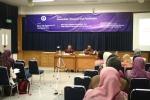Two ITB Students Won Schneider Go Green 2021 by Presenting their Prototype of Organic Batteries Made from Red Algae
By Adi Permana
Editor Adi Permana

BANDUNG, itb.ac.id -Two students of ITB have created an organic battery prototype from red algae and won the Asia-Pacific level Schneider Go Green 2021 competition. Those students are Yumna Dzakiyyah (Electrical Engineering 2019) and Richie Fane (Industrial Engineering 2019). It is predicted that they will continue their steps at the global competition level.
Yumna and Richie are part of a team called Carragenergy. In December 2020, they began to plan for ideas for this competition and had an in-depth discussion from January to March 2021.
They discussed several idea possibilities, starting from energy harvesting to solar cells, and finally decided to perform organic batteries as an idea for the competition.
The selection of red algae as the building block for the organic battery based on Yumna and Richie's research with a team from a start-up engaged in the SME (Small Medium Enterprise) field of seaweed farmers on Tidung Island. They found that we should analyze the use of seaweed in Indonesia to become beneficial for other applications. Also, the farmers only sell their harvest in cheap dried seaweed. Those reasons gave Yumna and Richie an idea to increase the farmers' welfare by increasing the added value from Indonesia's seaweeds by creating them as a constituent of organic batteries.
Organic Battery from Red Algae
The organic battery prototype created by Yumna and Richie is composed of an electrode component made of organic material and an electrolyte component from a seaweed extract called carrageenan. These batteries are included in the category of secondary rechargeable batteries. This prototype was made at ambient temperature and has been tested on the electrolyte components.
Based on the literature study, the performance of organic batteries with a combination of organic electrodes and electrolyte biopolymers has similar performance and is compatible with Li-ion batteries. Organic batteries have several advantages: eco-friendly, cheap, and reachable, considering that inorganic batteries harm the environment and health.
"With the public knowing about this battery, indirectly people will be more aware of environmental problems," said Richie.
ITB Electrical Engineering lecturer Dr. Ir. Mervin Tangguar Hutabarat, M.Sc., contributed to the manufacture of the organic battery prototype project. Also, he included another lecturer, namely Dr. Ir. Paula Santi Rudati, M.Sc., an expert in organic semiconductors, as a mentor for Yumna and Richie.
Yumna and Richie's efforts paid off. In early April 2021, the Carragenergy team won 1st place in the national level Schneider Go Green 2021. The team is privileged to be an ambassador from Indonesia at the Asia Pacific level against Australia, Singapore, and South Korea. After going through a fierce judging process, Carragenergy won again for the second time and will represent Asia-Pacific at the world-level competition.
At the end of the interview, Yumna and Richie expressed their hopes regarding this organic battery prototype. In the future, they hope that this project could impact life.
"We hope that we can influence the national community to be more concerned about our environment. We also aim to make a product that ultimately contributes to realizing a greener and more sustainable world," concluded Richie.
Reporter: Laurahoney Azzahra (Food Engineering, 2019)
Translator: Billy Akbar Prabowo (Metallurgical Engineering 2020)

.jpg)
.jpg)
.jpg)
.jpg)
.jpg)

